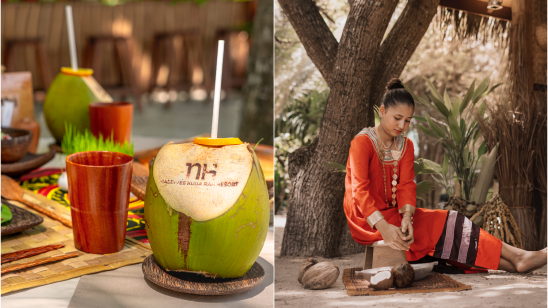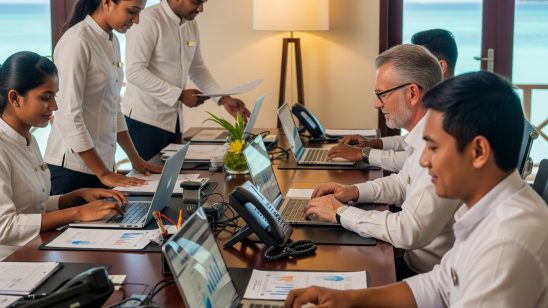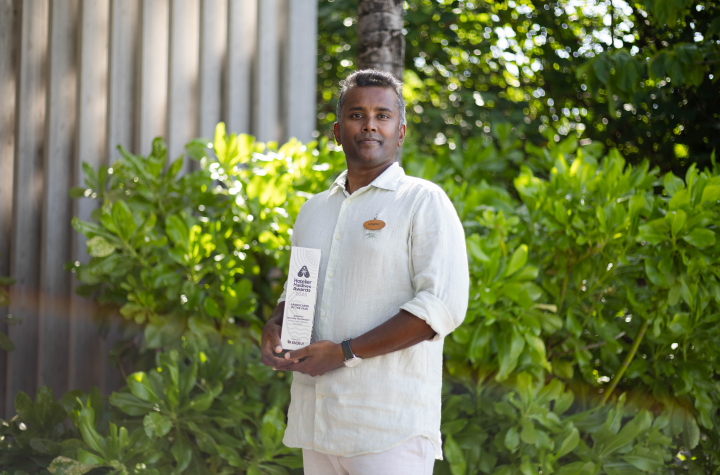
Dakshina Moorthy Thankarajan: Cultivating a landscape of purpose at The Ritz-Carlton Maldives, Fari Islands
By Maaish Mohamed and Mariyam Saliya Mohamed
At The Ritz-Carlton Maldives, Fari Islands, Dakshina Moorthy Thankarajan manages more than landscaped gardens. As Landscape Grounds and Environmental Manager, he leads a team focused on shaping and maintaining the environment of a manmade island in the Indian Ocean. In June 2025, this ongoing effort was recognised at the Hotelier Maldives Awards 2025 when Moorthy was named ‘Landscaper of the Year.’
For Moorthy, the award represents not an individual milestone, but a shared accomplishment. “Thank you so much. It’s truly an honour—and I must say this award isn’t just mine,” he explains. “I dedicate it wholeheartedly to my entire team. Every lady and gentleman working here at The Ritz-Carlton Maldives, along with my reporting leader and top management, has supported me tirelessly from day one.”
The journey that led to this recognition began with land that had less natural vegetation. “This island was fully reclaimed,” he says. “From that beginning, to now having guests who can’t even tell it’s a reclaimed island—that’s how far we’ve come. That transformation is what makes me proud.”
When the project started, the landscape offered no support for growth. The soil was dry, sandy, and alkaline. “Being a reclaimed island, the land here began as nothing more than sand—alkaline and infertile. Even small plants couldn’t grow at first,” he recalls. Building a self-sustaining environment required careful soil improvement. The team modified the composition of the earth over time, gradually making it suitable for different plant species.
Daily monitoring and repeated interventions helped improve soil quality. From composting and mulching to testing pH levels and nutrient content, progress depended on consistency. Every improvement, however small, contributed to making the land more suitable for plant life. “It took dedication, consistency, and daily effort to reach this level of natural beauty,” Moorthy says.
Sustainability shaped these efforts from the beginning. According to Moorthy, there was never a question of whether sustainable practices should be used. “Sustainability is essential for every resort in the Maldives—and now even guests expect it,” he says. We also care for the environment through sustainable practices. For instance, the banyan trees transplanted in our landscape were sourced from a local island, which was transformed into an agricultural island with our assistance, enabling the community to produce their own crops and giving the trees a second life. Furthermore, the timber used in constructing our villas and building structures was sourced from sustainably managed forests in Europe.
One of the key ways this commitment is realised is through the resort’s water use. “All the water used in our landscaping is recycled water from within the resort,” he explains. “We treat it to reduce pH and make it suitable for plants—no fresh water or desalinated water is used.”
Organic waste is also managed onsite through composting and mulching. “All garden waste—branches, leaves, trimmings—is turned into mulch, which we use directly on the grounds to enrich the soil and maintain ecological balance. Nothing goes to waste.”
For Moorthy, each part of the island has meaning. The layout and vegetation in every zone represent work completed over months and years. “Honestly, every corner of the resort means something to me, because we built it all from scratch,” he says.
One example is the canopy of trees lining the roadways. “Before, they were fully exposed to sunlight—but now, it’s a shaded, avenue-style walk,” he explains. The change may seem simple, but it adds comfort, reduces heat exposure, and enhances the walking experience for guests.
The EAU Bar area is another focal point. “It’s photogenic, highly Instagrammable, and loved by our guests,” he says. Its layout and planting have been designed to complement the space’s use and to create visual appeal. Moorthy also points to the Mystique Garden, which shows the level of detail and attention involved in shaping each part of the resort.
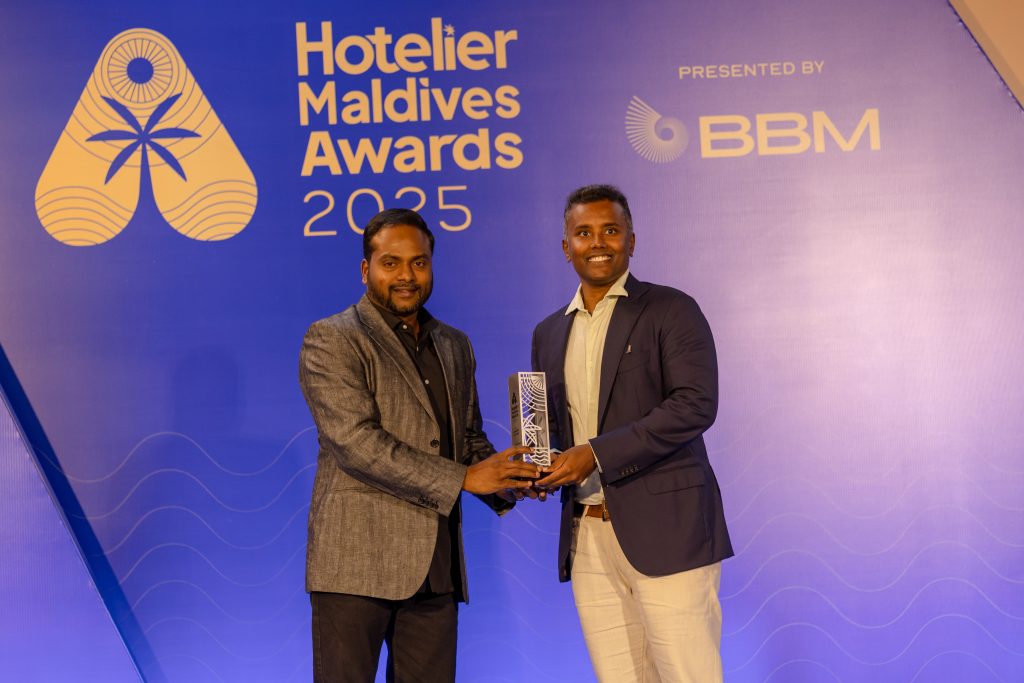
For visitors arriving at The Ritz-Carlton Maldives, Fari Islands, the environment creates the first impression. “Before they even step foot on the island, they see it far from the speedboat or seaplane. What they see is our greenery, our beaches, our layout,” he says. The landscaping must convey a sense of place from the outset. “We aim to give the feel of a naturally inhabited Maldivian island,” he explains. The goal is to shape the surroundings in a way that looks organic, even when every element has been planned and implemented deliberately.
Technology supports these goals. One system currently in use is a biodigester. “It converts all in-house food waste into organic fertiliser. It can process up to 1,000kg daily—enough to handle nearly 100% of our food waste even during high season,” he says. This reduces reliance on imported fertiliser while managing the food waste within the island’s limits.
Another area of innovation is water management. “We’ve introduced automated irrigation systems in certain areas,” he explains. These systems reduce the need for manual watering, saving time and labour while delivering water directly to the root zones of plants. The result is improved water use without sacrificing plant health.
Preservation of native species remains central to the landscape strategy. “We focus only on planting and nurturing endemic species—plants that are native to the Maldives,” Moorthy says. In the early stages of the project, even these species had to be brought from other islands. Today, the situation has shifted. “We’ve grown so much that we’re now able to donate plants to neighbouring communities.”
The team’s environmental work also includes outreach beyond the resort. “We run workshops in local islands like Gaafaru, where we educate women on kitchen gardening and the importance of self-sustainability,” Moorthy shares. These workshops are designed to encourage practical skills, promote healthy practices, and support environmental awareness.
Moorthy believes that there is no contradiction between luxury and nature. “True luxury lies in harmony with nature,” he says. Guests often arrive with expectations of what a Maldivian island should look like—white sand, palm trees, and a tranquil setting. It is his role to ensure that the island meets those expectations.
The sand itself is maintained through regular topping and management to ensure consistency in texture and appearance. In some cases, individual gardens are developed to meet the specific preferences of guests staying in particular villas.
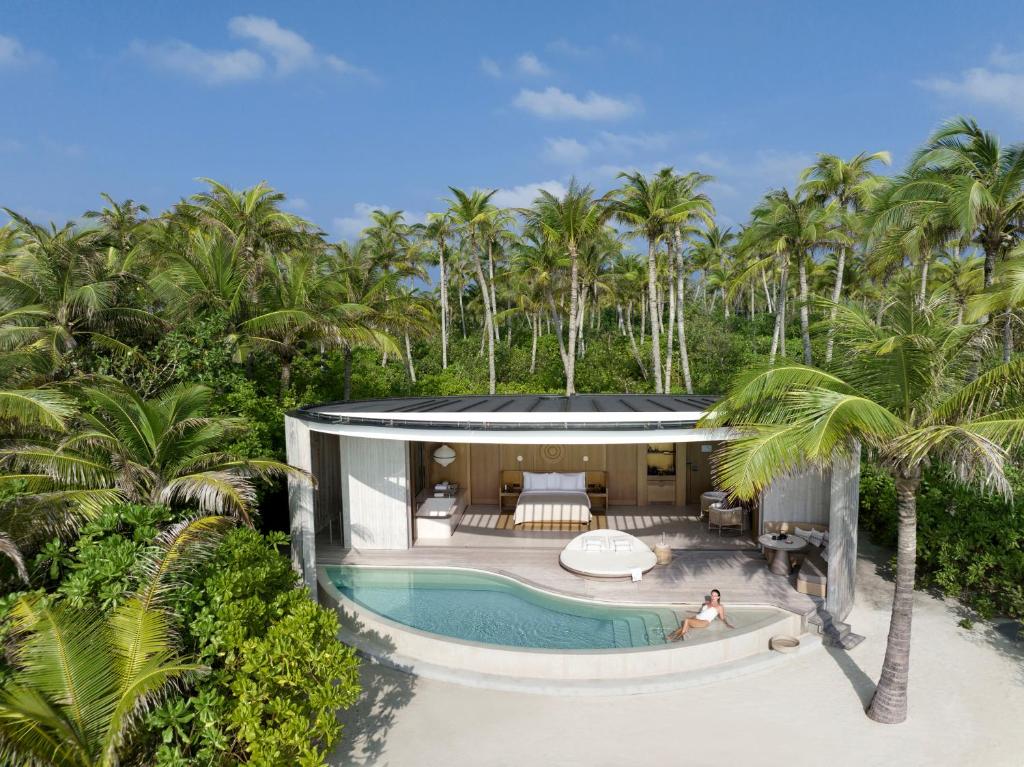
His own path to this work started in 2015, when he first came to the Maldives. “When I first arrived, I didn’t know what to expect,” he says. “Every island here is remote—you need to be flexible and open-minded.” Over the past decade, he has worked in different locations, gained experience with different soil types, and adapted to changing environmental conditions. “But the people here are kind, and I’ve never faced a single major issue in over ten years,” he adds.
For others considering a similar career path, Moorthy has a few pieces of advice. “The key qualities are adaptability and consistency,” he says. “If you’re passionate about nature and willing to learn, the Maldives offers a beautiful opportunity.”
Moorthy’s team is developing new initiatives. One involves hydroponics. “Guests will be able to pick their own herbs or vegetables and hand them to the chefs to cook fresh meals,” he says. The system will be housed in a greenhouse and maintained to support daily use by both staff and visitors. It combines sustainability, guest engagement, and education.
Other plans are still evolving. But Moorthy maintains a clear focus. “Landscaping is never finished—it’s a living, breathing part of the resort, and we’re committed to making it better every day.” Each day brings new challenges—from weather patterns to plant health—but also new opportunities for progress.
Dakshina Moorthy Thankarajan’s work at The Ritz-Carlton Maldives, Fari Islands is a long-term project shaped by ongoing learning and team collaboration. His role connects environmental management with guest satisfaction, community engagement, and ecological awareness. By building from reclaimed land, his team has created more than scenery—they’ve developed a system where land, water, and people function together. Through consistency and shared purpose, they continue to shape a resort environment that evolves with each passing season.





